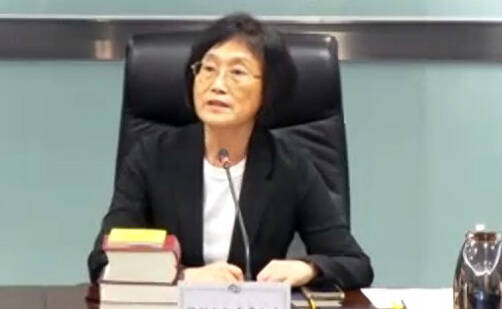The Financial Supervisory Commission (FSC) yesterday rejected CTBC Financial Holding Co’s (中信金控) bid to acquire Shin Kong Financial Holding Co (新光金控) through a public tender offer and share swap, saying the proposal lacked details and certainty that it would guarantee the interests of shareholders and the financial market’s stability.
The commission made clear its dislike for hostile takeover moves using share swaps because such arrangements would pose volatility to the firms’ share prices.
“CTBC Financial failed to put forth a sound plan to minimize predictable uncertainties,” FSC Deputy Chairwoman Jean Chiu (邱淑貞) told a news conference yesterday evening.

Photo: Wu Hsin-tian, Taipei Times
CTBC Financial last month proposed buying 51 percent of Shin Kong Financial shares on the open market and via a share swap scheme, a day after Taishin Financial Holding Co (台新金控) and Shin Kong Financial made a joint announcement about a merger through full share swap arrangements.
CTBC Financial also failed to address how it would fund the public tender offer or how it would handle Shin Kong Financial shares if the buyout falls through, Chiu said.
In addition, CTBC Financial failed to commit to capital increases for Shin Kong Financial’s life insurance arm, she said.
Financial conglomerates have a large market capitalization and should approach mergers and acquisitions with professional judgment and in a respectful manner, Chiu said, adding that CTBC Financial demonstrated a lack of understanding about Shin Kong Life Insurance Co’s (新光人壽) financial health. Cash-strained Shin Kong Life is the flagship unit of Shin Kong Financial.
Of the 195 mergers and acquisitions since 2002, only six attempts carried through using share swaps, Chiu said.
The commission has never approved the use of share swaps to purchase banks or life insurance companies because such schemes create volatility in mutual share prices and the financial market, she said.
The case is different for merger attempts because they should have won approval from bilateral board directors and attained the go-ahead from respective shareholders, she said.
CTBC Financial unveiled its buyout plan after board directors at Taishin Financial and Shin Kong Financial reached a merger agreement and discussed the matter for a long time, the commission said.
The commission said it is disappointed about the ongoing verbal attacks between CTBC Financial and Taishin Financial.
However, the commission said it does not favor merger bids over hostile takeover attempts, rather it assigns great importance to cash when reviewing hostile takeover bids.
In the past, tender bid initiators largely set their buyout target at 80 percent to diminish management right disputes and ensure smooth operations, Chiu said.
Taishin Financial and Shin Kong Financial next have to remove resistance from their shareholders before they put their case to regulatory review, the commission said.

MULTIFACETED: A task force has analyzed possible scenarios and created responses to assist domestic industries in dealing with US tariffs, the economics minister said The Executive Yuan is tomorrow to announce countermeasures to US President Donald Trump’s planned reciprocal tariffs, although the details of the plan would not be made public until Monday next week, Minister of Economic Affairs J.W. Kuo (郭智輝) said yesterday. The Cabinet established an economic and trade task force in November last year to deal with US trade and tariff related issues, Kuo told reporters outside the legislature in Taipei. The task force has been analyzing and evaluating all kinds of scenarios to identify suitable responses and determine how best to assist domestic industries in managing the effects of Trump’s tariffs, he

TIGHT-LIPPED: UMC said it had no merger plans at the moment, after Nikkei Asia reported that the firm and GlobalFoundries were considering restarting merger talks United Microelectronics Corp (UMC, 聯電), the world’s No. 4 contract chipmaker, yesterday launched a new US$5 billion 12-inch chip factory in Singapore as part of its latest effort to diversify its manufacturing footprint amid growing geopolitical risks. The new factory, adjacent to UMC’s existing Singapore fab in the Pasir Res Wafer Fab Park, is scheduled to enter volume production next year, utilizing mature 22-nanometer and 28-nanometer process technologies, UMC said in a statement. The company plans to invest US$5 billion during the first phase of the new fab, which would have an installed capacity of 30,000 12-inch wafers per month, it said. The

Taiwan’s official purchasing managers’ index (PMI) last month rose 0.2 percentage points to 54.2, in a second consecutive month of expansion, thanks to front-loading demand intended to avoid potential US tariff hikes, the Chung-Hua Institution for Economic Research (CIER, 中華經濟研究院) said yesterday. While short-term demand appeared robust, uncertainties rose due to US President Donald Trump’s unpredictable trade policy, CIER president Lien Hsien-ming (連賢明) told a news conference in Taipei. Taiwan’s economy this year would be characterized by high-level fluctuations and the volatility would be wilder than most expect, Lien said Demand for electronics, particularly semiconductors, continues to benefit from US technology giants’ effort

‘SWASTICAR’: Tesla CEO Elon Musk’s close association with Donald Trump has prompted opponents to brand him a ‘Nazi’ and resulted in a dramatic drop in sales Demonstrators descended on Tesla Inc dealerships across the US, and in Europe and Canada on Saturday to protest company chief Elon Musk, who has amassed extraordinary power as a top adviser to US President Donald Trump. Waving signs with messages such as “Musk is stealing our money” and “Reclaim our country,” the protests largely took place peacefully following fiery episodes of vandalism on Tesla vehicles, dealerships and other facilities in recent weeks that US officials have denounced as terrorism. Hundreds rallied on Saturday outside the Tesla dealership in Manhattan. Some blasted Musk, the world’s richest man, while others demanded the shuttering of his